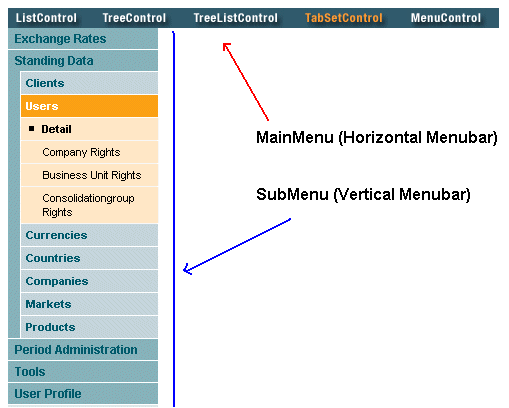| Attribute | Type | Description | Req. | RTExp |
| action | String |
Specifies the Struts Action that is to be called upon selection
of a menu entry. However, the action can also be specified
individually in the individual menu options.
| |
|
| height | String |
Sets the height of the control element. The height
may be specified in absolute or percent terms.
See the HTML documentation
| |
|
| id | String |
The name of a page scope JSP bean that will contain
the current element.
Using the given Id, the variable can be
accessed in scripting expressions in the tag Body.
The id mus be a string lteral because the JSP
compiler generates a variable withthis name at compile
time
Annotation:
A valid Java identifier must be given.
| |
|
| imagemap | String |
Specifies the name of an Imagemap which must be saved
in the request. The value of the imageref property of
the menu entries are mapped to the entries in this
Imagemap. The mapping is done with the help of the
regular expression, which is assigned to every entry
of the Imagemap.
The Painter appends to the imageref-value implicit, the
following suffixes in order to distinguish between different states:
-
.sel = selected menu entry.
-
.dis = disabled.
-
.unsel = de-selected menu entry.
The selected menu option is always determined through the current
menu context which can be set in the JSP-Page with <menu:ctx> or
in the application with com.cc.framework.ui.control.MenuContext.setPath().
Annotation:
Under the name, there must be an Imagemap saved in the request.
| |
|
| locale | String |
enables localization for the control element.
String literals will be interpreted as keys
in the Application.properties file.
Annotation:
boolean value true oder
false oder the name of a locale.
| |
|
| menuid | String |
Defines the internally used identificator of the menu.
A menu path can also be specified here.
A menu or menu option can be considered to be selected
when the current menu context path starts with the
identificator given here!
Example:
The Id of the menu is
admin/tools
and the current context path is
admin/tools/dbquery
.
- The entire menu is then considered to be selected.
- A lower-level menu option with the id
dbquery would
now be depicted as an active menu option since its complete menu path
admin/tools/dbquery fits in the context path.
- The lower-level menu option with the id
sessionlist
would be depicted as an unselected menu option, since ist complete
menu path admin/tools/sessionlist does not fit in the context path.
Annotation:
Individual path elements are delimited with "/".
| |
|
| name | String |
Specifies the name of the Java-Bean.
The Java-Bean must be stored in the given scope.
When the tag is surrounded by a Struts <html:form> tag,
no Bean Name need be specified. In this case, the Java-Bean
is drawn via a property of the Struts Form Bean.
Annotation:
A valid Java identifier must be given.
| |
|
| permission | ACL |
With this attribute, access to the element can be restricted.
Authorizations are checked using the com.cc.framework.security.Principal
object in the user session. The principal object is registered in the session
with the method com.cc.framework.security.SecurityUtil#registerPrincipal(HttpSession, Principal).
It is made available by the application developer by implementing the principal
interface. In this manner, any authorization system can be very easily connected
within the framework.
Authorizations are always specified in the form of an Access Control List (ACL).
What is involved here is a semicolon-delimited list with individual authorizations.
The framweork supports the following authorization types, which, however, can be
expanded at will by the application developer:
- Literal
- true|false -> com.cc.framework.security.StaticPermission
- Role
- #rolename -> com.cc.framework.security.RoleBasedPermission
- Function
- $functionname -> com.cc.framework.security.FunctionBasedPermission
| |
|
| property | String |
Specifies the name of the property using which the Java-Bean
is to be accessed. This is generally only necessary when
the Java-Bean is associated with a Struts Form Bean.
Annotation:
A valid Java identifier must be given.
| |
|
| style | String |
An HTML-style can be directly specified with this attribute.
Annotation:
See HTML documentation for the attribute style.
| |
|
| styleClass | String |
The HTML-class attribute of the element can be specified with this attribute.
Annotation:
See HTML documentation for the attribute class.
| |
|
| styleId | String |
The HTML-id attribute of the element can be specified with this attribute.
Annotation:
See HTML documentation for the Attribute id.
| |
|
| type | MenuType |
Specifies the menu type and hence the visual appearance of the menu.
-
main
=
for a horizontal main menu.
-
tools
=
for a horizontal Tools menu .
-
sidebar
=
for a vertical menu.
| |
|
| width | String |
Sets the width of the control element. The height
may be specified in absolute or percent terms.
See the HTML documentation
| |
|
